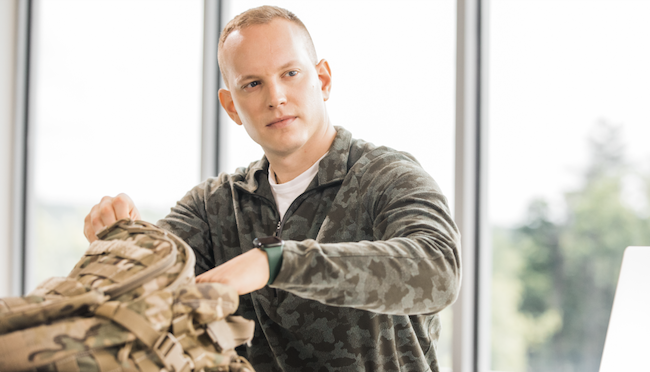Approximately 5% of undergraduate students in the United States are veterans, active-duty service members and reservists. Military-connected learners also include military spouses, dependents, and Gold Star families. These students face the same challenges as other learners, but they also deal with unique obstacles—like navigating military education benefits, staying enrolled during frequent moves or deployment, and receiving college credit for military experience.
The Center for Higher Education Policy and Practice (CHEPP) has published a new paper, Advancing Access and Success in Higher Education for Military-Connected Learners, that outlines these challenges and offers strategies that colleges can use to better support students.
Who Are Military-Connected Learners?
Military-connected learners represent a broad and diverse group that require tailored support to succeed in higher education:
- Active-duty service members who take classes during irregular schedules and may face deployments or relocations mid-semester. They often rely on Tuition Assistance (TA) and need flexible course structures.
- Veterans who are returning to education after active service and using benefits administered by the U.S. Department of Veterans Affairs such as the post-9/11 GI Bill®. Many are adult learners who work full-time or support families while enrolled.
- Reservists and National Guard members who shift between civilian work and military service commitments, creating challenges in course planning and degree progression.
- Military spouses and dependents who face frequent relocations and unpredictable family obligations due to Permanent Change of Station (PCS) orders and deployments. They often struggle to transfer college credits and access to childcare.
The Challenges Military-Connected Learners Face and Strategies to Address Them
Admission and Enrollment
- Finding the right college can be difficult – especially when college that advertise as “military-friendly” lack military-specific supports. Colleges should consider dedicated admissions and enrollment teams to help ensure that prospective students find programs that work for them.
- Access to military education benefits, such as the GI Bill®, Tuition Assistance, and state scholarship programs can make paying for college confusing and processing of these benefits can sometimes delay enrollment. Colleges should have military education benefit specialists to help ensure students are accessing the benefits they are eligible for.
- Limited recognition of prior learning, even when military training clearly aligns with course content, can result in students being required to retake courses they have already mastered through professional experience or military service. Colleges should adopt streamlined credit transfer policies, including recognizing military service captured in a student’s Joint Service Transcript (JST).
Academic and Student Experience
- Cultural adjustment challenges are common among military-connected learners. College should administer training for faculty and staff to build cultural competence in military-specific needs, such as Green Zone training.
- Deployment orders, caregiving responsibilities, and changes in duty stations can lead to stop-outs or slow progress toward a degree. To help students navigate these disruptions, colleges should consider policies like deadline extensions and alternative materials that enable students to continue to progress in their courses.
Career Connectivity
- Translating military skills to civilian employment can be difficult. Colleges should provide targeted career coaching including interview prep and resume development. Colleges should also partner with military friendly employers to help connect students to work-based learning and employment opportunities.
Changing Practice and Informing Policy
These strategies, detailed further in CHEPP’s new paper, Advancing Access and Success in Higher Education for Military-Connected Learners, provide a blueprint for colleges and universities to honor military-connected learners’ service by supporting their long-term success.

